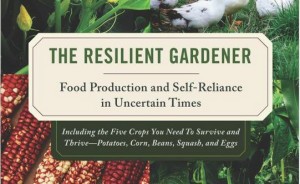Four crops for self sufficiency

Most vegetable gardens gravitate to salad vegetables. But humans don’t live on salad alone. If you’re interested in growing the bulk of the food needed to sustain you throughout the year, consider the recommendations of Carol Deppe. In her book, The Resilient Gardener: Food Production and Self-Reliance in Uncertain Times , she advises four garden crops for subsistence gardening; potatoes, squash, beans, and corn.
, she advises four garden crops for subsistence gardening; potatoes, squash, beans, and corn.
Potatoes – You can easily “grow enough potatoes to provide all the calories and most or all of the protein your family needs for a large part of the year.” Potatoes require little store-bought inputs, and they don’t need very fertile soil. Ms. Deppe declares that potatoes are drought resistant, although I have grown potatoes both with and without heavy irrigation, and I definitely get more potatoes with more water.
They don’t require special threshing , drying, dehulling or grinding. They are the easiest vegetables to store. Growing your own helps you to avoid the nasty pesticides and other poisons in store-bought potatoes. Several different varieties are recommended for baking, boiling, salad, and hash browns. She recommends ‘Yukon Gold’ for all uses except baking. ‘Azul Toro’ is a blue variety she recommends for baking, hash browns, and mashing. ‘Skagit Beet Red’ is intensely red inside and out, and is her recommendation for intensely red mashed potatoes.
Squash – Winter squash are ideal for a long lasting food supply. The book explains the three types of squash, explains the need for proper curing time, and recommends several varieties. She explains that the bigger squash have a higher proportion of flesh and provide a large food supply. Baked mashed squash freezes well for a less labor intensive meal. Ms. Deppe recommends “Sweet Meat-Oregon Homestead.” They are 16-24 lbs. with a “very sweet, rich flavored flesh that is unsurpassed in quality.” She says this squash is “by far the best one for producing serious amounts of truly gourmet-quality food with minimal labor.”
Beans – they are the richest source of protein in the plant world, and are excellent sources of carbohydrates and fiber. They are easier to harvest and thresh than all other grains except corn. Consider growing dry beans, shell beans, bean pods, and even the shoots, flowers, tendrils, leaves and roots. For dry beans, two “winner” beans Ms. Deppe recommends are Black Coco (early, very productive, wonderful flavor, widely adapted) and Gaucho (early, productive as any she’s grown, delicious rich flavor.)
Corn – It is the premier grain for producing calories, and is far easier to grow and thresh than other grains. Although corn requires more fertility than most other crops, it produces a much higher yield than all crops except potatoes. Ms. Deppe’s corn recommendations focus on corn that’s good for cornbread, polenta, parching, corn gravy, cake, and johnnycake. Flour corns grind very easily. Corn for these flour uses are categorized as flint corn, flour corn, and dent corn. Flints don’t require as much heat to grow, but are harder to grind. Dents are crosses between flour and flint types. Their main virtue is high yield. ‘Reid’s Yellow Dent’ is a very productive mid to full season dent that is very productive and widely adapted. It makes large ears.
These four crops can provide most calorie needs throughout the year. This information is especially useful for the homesteader or those who are environmentally conscious and desire to avoid reliance on the fossil-fueled industrialized food system. These four choices will allow you to produce enough food for your family in the event of extreme shortages in supermarkets. You can have much greater control over your food supply.
The four vegetables are suitable for production by hand on a small scale. Staples like wheat and oats are not easy in a home garden.
Carol Deppe’s book, The Resilient Gardener, has in depth information about growing these staple crops. It describes an efficient, low-tech method of planting, weeding, harvesting and processing and Deppe’s guidance on the selection of varieties, on garden layout and planning, and on pollination is basic, helpful, and encouraging. The book was published in 2010.
You will find nutritional information, recipes, and storage and preservation information. The focus is on dehydrating, Deppe’s preferred method of preservation.
As a fifth self sufficiency food supply recommendation, Ms. Deppe recommends keeping ducks. They are great at converting grass and slugs into high quality eggs that are bigger than chicken eggs, and have more nutrition. Free range eggs supply omega 3 fatty acids which aren’t available from plants. Ducks can forage a larger part of their diet and eat more greenery than chickens. They eat excess garden produce. Ducks are easier to herd and control than chickens, and are more resistant to disease. Their manure fertilizes the garden and they are experts at pest control. And best of all, they are fun and entertaining.
I raised and sold duck eggs for a few years. I researched the nutritional benefits. The results can be found here.
The Resilient Gardener has a similar target audience to Gardening When It Counts: Growing Food in Hard Times. Both offer a unique perspective on self-sufficiency.
 , she advises four garden crops for subsistence gardening; potatoes, squash, beans, and corn.
, she advises four garden crops for subsistence gardening; potatoes, squash, beans, and corn.


